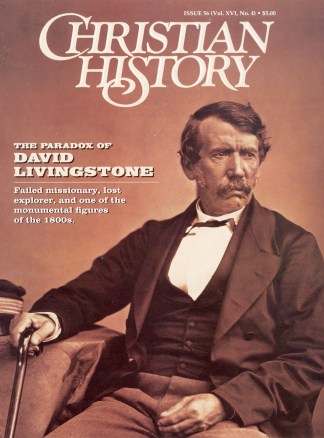Find out Livingstone, and get what news you can relating to his discoveries.”
With this terse command, the owner of the New York Herald sent his most tenacious young reporter, Henry Stanley, plunging into the wild heart of the Dark Continent. The Herald hoped the story would sell papers by drawing on readers’ curiosity about the legendary David Livingstone. Stanley signed on for the sake of adventure, prestige, and journalistic duty—but not for the sake of the gospel.
Stanley (born John Rowlands) was not cast in a missionary mold. Both his father and mother abandoned him before his first birthday, leaving him in the cold care of reluctant relatives.
At 15 he came to America, where he acquired his second name from a wealthy American merchant, Henry Stanley, who showed kindness to the boy and soon adopted him as a son.
Stanley fought in the Civil War (first for the South, then the North). He discovered his gifts as a reporter through writing accounts of the battles he experienced, and later moved to New York to write professionally.
Once in Africa, Stanley was swindled by his native guides, threatened by belligerent kings, and brought “to the verge of the grave” by dysentery. No encouraging news of Livingstone’s whereabouts offset these trials, and Stanley fought cynicism and depression. “Is this Dr. David Livingstone a myth?” he cried in one dispatch. “Is there such a person living? If so, where is he?”
“Dr. Livingstone, I presume?”
The best reports Stanley could collect placed Livingstone at Ujiji, a city on the northeast coast of Lake Tanganyika. As Stanley’s men marched, unsure if they would find Livingstone alive, dead, or not at all, several deserted. Tribal leaders demanded tribute at every turn, and Livingstone’s letter carrier never appeared for a scheduled meeting.
Finally, two months after Stanley had admitted his hopelessness, the party reached the village. They celebrated their final march with horn blasts and cannon muskets, which thoroughly frightened the residents of Ujiji. In the confusion, Stanley heard a voice shouting, in English, “How do you do, sir!”
One of Livingstone’s servants had been sent to meet the man marching under the American flag. Livingstone was alive and waiting for his well-traveled visitor. At the first sight of the gray-bearded man in a navy cap and red woolen jacket, Stanley was tempted to run up and shake hands with him. However, he was concerned about his own image and a little worried that the explorer would disdain such a demonstration in front of an Arab and native crowd. Instead he offered his famous, stuffy salutation:
“Dr. Livingstone, I presume?”
“Yes,” the explorer answered. “You have brought me new life.”
Stanley described Livingstone as a “truly pious man—a man deeply imbued with real religious instincts. His religion … is of the true, practical kind, never losing a chance to manifest itself in a quiet, practical way—never demonstrative or loud. It is always at work, if not in deed, by shining example.”
Livingstone’s tacit evangelism touched Stanley, who had arrived in Africa “as prejudiced against religion as the worst infidel in London.” Livingstone had truly left all to follow Christ, and his model of dedication converted Stanley. After Livingstone’s death, Stanley stepped up to continue his fantastic voyages.
Controversial career
When Stanley returned to Africa in 1874, he aimed to further Livingstone’s investigation of potentially navigable rivers, not merely to get a good story but in hopes that such a river would bring the gospel to the continent’s interior.
Like Livingstone, Stanley was more considerate of the Africans than were the vast majority of his white peers. He never labeled the Africans “savages” or “brutes,” nor did he take advantage of them. He detested the slave trade. The young white men sent to oversee the Congo after Stanley’s brief tenure as its administrator derided him for his “Negrophilia.” Stanley’s practice was to treat the Africans with civility, unless he judged them to be hindering his divine work. Only then did he turn violent, contributing to his African name Bula Matari: “The Breaker of Rocks.”
Take, for example, his encounter with the residents of the island of Bumbire in August, 1875. They had tormented and detained Stanley earlier, and when he returned to Lake Victoria, he made war against them. His men paddled their canoes up to the island and opened fire on its residents, killing 42 and wounding 100. This “work of punishment” received full treatment in a Herald dispatch.
Stanley soon gained a reputation as the most ruthless explorer of his age, but he did not deserve the ignominy. Most explorers left ugly episodes out of their accounts, and their whitewashing made Stanley, who freely described his exploits, appear darker.
The pen is mightier
Stanley achieved unquestionable success in one respect: recruiting missionaries. In a dispatch published jointly by the Herald and the British Daily Telegraph, he jubilantly reported he had nearly converted the previously Muslim king of Uganda, opening that country’s door wide for Christianity: “But, O that some pious, practical missionary would come here! What a field and a harvest ripe for the sickle of the gospel!”
The enthusiasm of Uganda’s king fell short of Stanley’s hope, but the response of Victorian Christians exceeded expectations. Missionaries sailed in by the hundreds as new agencies rushed into Stanley’s world, and Livingstone’s work flowed on.
Elesha Hodge is assistant editor for electronic media, ChristianityToday.com.
Copyright © 1997 by the author or Christianity Today/Christian History magazine. Click here for reprint information on Christian History.










